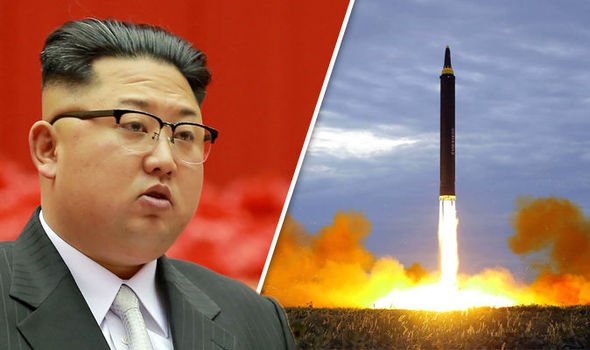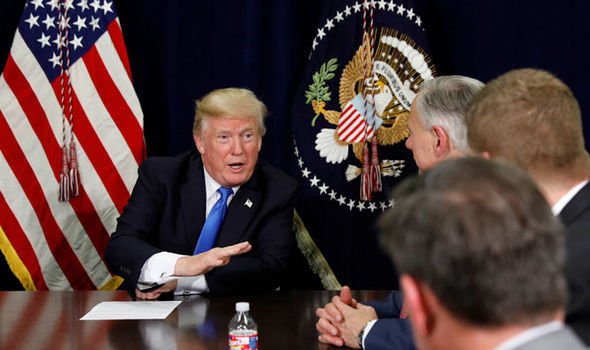North Korea announces plan for HUGE nuclear test - USA on alert

North Korea has repeatedly threatened to use nuclear weapons to destroy America and has now announced plans to carry out a provocative new test.
A senior diplomat from Pyongyang today said warnings of a possible atmospheric nuclear test over the Pacific Ocean should be taken “literally”.
The official told CNN the threat by the hermit state’s despot Kim Jong-un should not be taken lightly.
Ri Yong Pil said the foreign ministry was aware of plans for a launch and urged Washington to prepare itself.
He said: “The foreign minister is very well aware of the intentions of our supreme leader, so I think you should take his words literally.”
Last month North Korea’s foreign minister Ri Yong Ho said Pyongyang was considering “the most powerful detonation” of a hydrogen bomb over the Pacific Ocean.
This would mark a concerning deterioration of the already-tense situation on the peninsula.
North Korea has conducted six nuclear tests in its history, with half taking placein the last 21 months.
All six have taken place in underground testing facilities deep within Kim's rogue state.
A seventh test carried out in the atmosphere above an already-turbulent region would therefore mark a worrying milestone in North Korea's march towards nuclear power.
The most recent test took place on September 3 at the Punggye-ri Test Site.
It was so powerful it was registered as a 5.7 magnitude earthquake by the South Korean government.
China and the US also registered it as an earthquake at at even-stronger 6.3 magnitude.
The US Geological Society said: “Possible explosion, located near the site where North Korea has detonated nuclear explosions in the past.”
Kim Jong-un has already put far more focus on nuclear testing and missile launches than his father Kim Jong-il and grandfather Kim il-Sung.
CIA chief Mike Pompeo said last week that North Korea could be only months away from gaining the ability to hit the United States with nuclear weapons.
Experts say an atmospheric test would be a way of demonstrating that capability.
Trump next week will make a visit to Asia during which he will highlight his campaign to pressure North Korea to give up its nuclear and missile programs.
He has not yet made clear whether he will visit the demilitarised zone on the border between North and South Korea.
Trump told reporters on the White House South Lawn: “I'd rather not say but you'll be surprised.”
Trump is scheduled to depart on November 3 on a trip that includes visits to Japan, South Korea, China, Vietnam and the Philippines.
It comes after the US Navy sent aircraft carrier strike group Nimitz to its 7th fleet area of operation, which includes the Western Pacific and Indian Ocean.
It joins two other carriers, the Ronald Reagan and Theodore Roosevelt, in the region. Additional aircraft carriers are usually viewed suspiciously by China and North Korea.
Navy officials said the Nimitz, which was previously carrying out operations in support of the fight against Islamic State in Iraq and Syria, would be ready to support operations in the region before heading back to its home port and the movement had been long planned.
US President Donald Trump, meanwhile, has hit out at Russia, claiming officials in Moscow are hindering American efforts to force North Korea to give up its nuclear arms.
Mr Trump said while China had supported them, Moscow had obstructed. He said: “China is helping us and maybe Russia’s going through the other way and hurting what we’re getting.”

He added a better relationship with Russia would help contain the threat from North Korea.
The North Korea state-run news agency said: "It expressed the conviction that the relations between the two parties and the two countries would develop in the interests of the peoples of the two countries.”
Analysts believe it is too early to say if relations are warming between the two nations.
Yang Moo-jin, professor at the University of North Korean Studies in Seoul, said: "Congratulatory messages between North Korea and China is an old story and reading too much into the message exchanged would be a one-sided analysis.
"It's what they usually do and not surprising at all."
Australia has revealed it is also in written communication with Kim's state - through monthly faces.
Secretary of state Frances Adamson told a committee on foreign affairs: "The way the North Koreans communicate is typically a little unusual because we're not engaged with them as a close partner.”
Ms Adamson said the two nations were not on good terms but had "occasionally reasons to have contact”.
One such example was after the September 3 nuclear test when Canberra officials wrote to the hermit state to protest.
It's real??